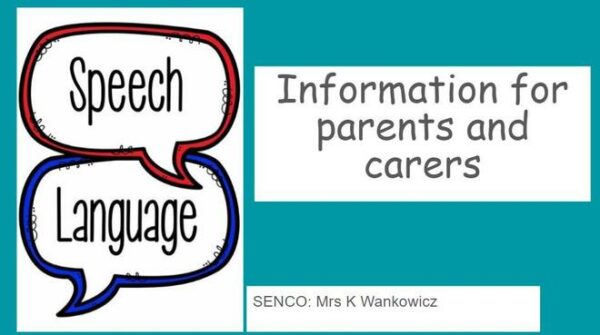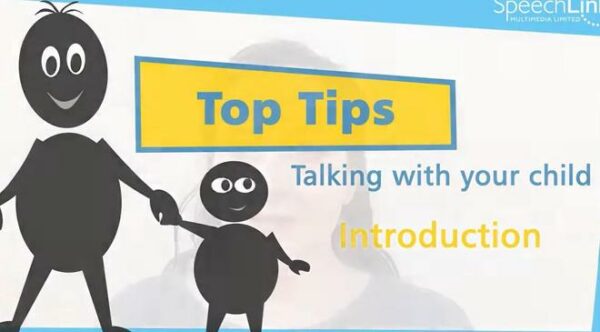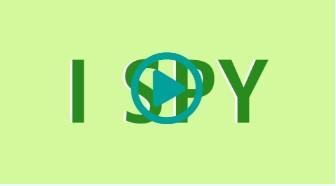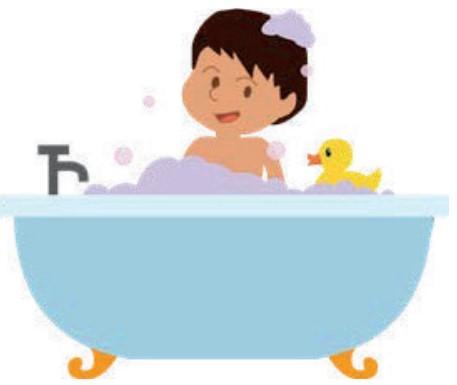Speech, language and communication underpin everything we do – making our needs known, expressing our likes and dislikes, interacting with others and building relationships. We often take these skills for granted, but many children struggle to communicate. They have speech, language and communication needs or SLCN.
Speech and Language
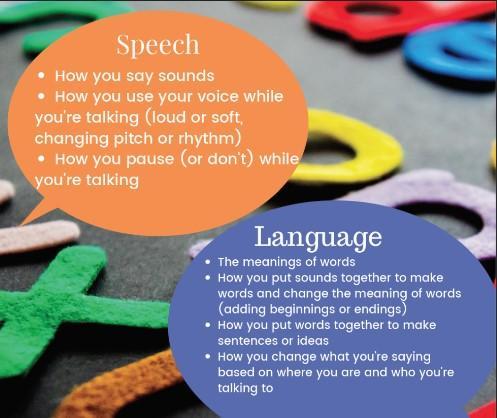
A child with speech, language and communication needs:
- Might have speech that is difficult to understand They might struggle to say words or sentences
- They may not understand words that are being used, or the instructions they hear
- They may have difficulties knowing how to talk and listen to others in a conversation
Children may have just some or all of these difficulties; they are all very different. Speech, language and communication are crucial for reading, learning in school, for socialising and making friends, and for understanding and controlling emotions or feelings. SLCN is often called a ‘hidden difficulty’. Many children with SLCN look just like other children, and can be just as clever. This means that instead of communication difficulties people may see children struggling to learn to read, showing poor behaviour, having difficulties learning or socialising with others. Some children may become withdrawn or isolated. Their needs are often misinterpreted, misdiagnosed or missed altogether
Information for Parents and Carers
We work closely with the Speech and Language Team in North Tyneside
Our speech and language therapy service can support children and young people from birth to 19 who have speech, language or communication needs or difficulties with eating, drinking or swallowing.
These include:
- Stammering, where sounds or words are regularly repeated or a lot of effort is needed to produce them.
- Speaking with a persistently unusual voice quality, which might sound croaky, breathy, or hoarse.
- Difficulties in saying specific sounds when talking making your speech difficult to understand by others.
- Difficulties with speaking, including difficulties putting words and sentences together to ask for something, telling a story or holding a conversation.
- Making sense of what other people say to you and/or understanding and using body language and eye contact.
- Difficulties learning the ‘rules’ of conversation such as when it is your turn to speak and when it is time to change the topic of conversation.
- Feeding or swallowing difficulties.
As well as occurring on their own, these difficulties are common in children and young people who have other diagnoses such as autism spectrum disorder, cerebral palsy, cleft palate, learning, physical or hearing difficulties.
As well as working directly with children and young people we support their families and carers, their teachers or childcare staff and other professionals who have regular contact or work with them.
We carry out assessments, including observations of play, learning activities and will observe meal times for children who are experiencing feeding or swallowing difficulties. We sometimes work with other professionals to help us carry out assessments.
Our aim is to help children and young people develop their best possible communications skills, taking into account their individual abilities and needs.
Most importantly we look at the impact of their communication difficulty on the child, young person’s life, their family and aim to find ways of reducing this as much as possible.
This can include one or a combination of:
- A programme of agreed targets or goals for the child or young person, parents or carers, and other professionals who support them.
- Coaching and education for parents/professionals working with the child or young person on specific communication/feeding techniques.
- Specialist support from a speech and language therapist or assistant speech and language therapist for short periods of time to help develop specific communication skills
- Liaising with other services involved in the child or young person’s care, for example, the feeding team at Royal Victoria Infirmary and Regional Communications Aids Service.
If you are worried about your child’s speech, speak to their teacher or to our SENCO.
How to help your child with their speech and language
It’s not always easy to think of ways to help develop your child’s speech and language skills especially when family life is so busy. We asked our speech and language therapists for some quick tips to help.
Here are their ideas for working on speech and language skills that are quick to implement at home
- Repeating sounds and words: When a child makes a mistake with their words or sounds, repeat the sentence back correctly so that they can understand where the mistake happened. E.g., ‘I goed to the shops.’ you repeat back, ‘You went to the shops?’
- Plan out talking time: The best way to support communication, is to communicate more. Choosing an everyday activity and turning it into a conversation is a great way to support communication.
- Giving time: In a conversation with a child, give more time between turn-taking. This is to let the child process the meaning of what they have heard and think of what to say
- Helping out: Have your children help with putting the grocery shopping away. Ask them what each product and ask them where they belong in the kitchen.
- Watch TV together: Watch your child’s favourite tv show, then have them retell you what happened in the show.
- Use visuals to support understanding: There are a wide range of different visual cues, so pick one that is best matched to the situation and the child’s level. E.g., photos, picture-drawing, videos, signs, etc.
- Don’t pretend to understand: Encourage your child to find another way to communicate their message if it’s not the correct way.
- Expand your child’s expressive language: Repeat back what the child has said and then add in one or two extra words. E.g., the child says, ‘She’s got a bike.’ and you say ‘Yes, she’s got a new red bike.’

